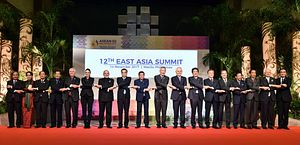The recently-held 12th East Asia Summit (EAS) in the Philippines was crucial for India in many ways. With the Trump administration and many other countries increasingly veering towards the use of the terminology “Indo-Pacific,” many in India and outside see it as proof of India’s growing importance in the region.
This Summit was important for India in many ways.
First, it presented an occasion for Prime Minister Narendra Modi to share his views personally with the leaders of the EAS countries. New Delhi has been a founding member of the East Asia Summit ever since the first summit was held in 2005 and the renaming of the erstwhile “Look East Policy” as the “Act East Policy” by the Modi government in 2014 only goes to show the importance accorded to this policy initiative by the Modi government.
Second, this year’s summit marked the first time that Modi met the heads of state of the EAS countries since the Doklam stalemate happened. In June 2017, China started constructing a road through disputed territory (claimed by Bhutan and China) and India took a strong stand in favor of Bhutan. The Doklam incident marked a dip in the ties between the two Asian behemoths. This EAS also took place after Xi Jinping was elected to a second five-year term at the Party Congress in October this year.
Third, this year, India and ASEAN are celebrating 25 years of their dialogue partnership. The two have come a long way ever since New Delhi became a sectoral dialogue partner of ASEAN way back in 1992. In early January next year, when India celebrates its Republic Day, the heads of state of all the ASEAN states are likely to participate, marking a new chapter in ASEAN-India ties.
Fourth, some of the EAS countries are also looking at India in a new light. Although most of the EAS nations have welcomed China’s Belt and Road Initiative (BRI), also known as the One Belt One Road (OBOR), some of them are anxious about Beijing’s growing influence on the region and see a kind of balancer in New Delhi .
Fifth, the recent meeting of officials from the United States, Japan, India, and Australia on the sidelines of the ASEAN Summit and the East Asia Summit in Manila means that these countries are now less coy about making their choices, unlike in the past. The “Quad” meeting was also a reaffirmation of the changed realities in the region, which has been marked by the meteoric rise of China and a marked disinterest from the United States in being a part of multilateral arrangements like the Trans-Pacific Partnership. These four democracies had come together once earlier in 2007, but the initiative had fallen flat as Kevin Rudd-led Australia and India were both unwilling to annoy China.
From a somewhat “outlying” position, India has come to the center stage of geopolitics and geoeconomics in the region represented by the East Asia Summit countries. With the United States under President Donald Trump making confusing noises about American interests in the region, many of the EAS countries are scratching their heads over whether Washington would continue to play its traditional role in the region as the main upholder of a rules-based order. Given Trump’s open praise of China on occasions and his penchant to cut deals, it seems that some of the EAS nations see in India a counter-balancing force in the region.
The East Asia Summit member countries (18 in total) are facing a host of challenges, both in the political and the economic realm. Though India is not a part of the TPP negotiations, it is an important part of the RCEP negotiation process. New Delhi has much to offer to the EAS and also gain in return, especially in areas like “maritime security, terrorism, non-proliferation, irregular migration, etc.” Hence, this growing partnership represents a win-win equation for both India and the EAS.
Dr. Rupakjyoti Borah is with the Institute of South Asian Studies at the National University of Singapore. His latest book is The Elephant and the Samurai: Why Japan Can Trust India? He has been a Visiting Fellow at the University of Cambridge (U.K.) and the Japan Institute of International Affairs (JIIA), Tokyo. The views expressed are personal. You can follow him on Twitter: @rupakj

































